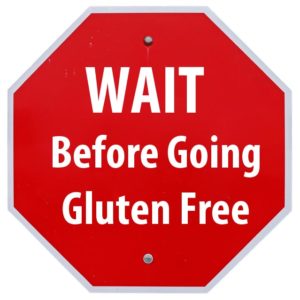Surely you have heard about all of the great things that will happen to you if you go gluten free!
- Lose weight
- Have more energy
- Clearer skin
- Less headaches
- Digestion will improve
- Healthier diet
Who wouldn’t want to reap the benefits of greater health?
Why you shouldn’t just jump in and try it
Symptoms
 If gluten free is the diet you feel you should try in order to improve your health, wait! This is the second hardest step in going gluten free. Educate yourself about celiac and gluten intolerance. I have worked with people with these conditions for over 10 years and have seen a wide array of people with different symptoms. Everything from shoulder pain to severe gastro-intestinal issues.
If gluten free is the diet you feel you should try in order to improve your health, wait! This is the second hardest step in going gluten free. Educate yourself about celiac and gluten intolerance. I have worked with people with these conditions for over 10 years and have seen a wide array of people with different symptoms. Everything from shoulder pain to severe gastro-intestinal issues.
Not all symptoms for celiac are severe!
Many symptoms aren’t even related to the gastro-intestinal tract. Celiac is a full body, multi-system disease. You see, when you can’t properly absorb vitamins and minerals it can affect your entire body, in many different ways. We are all so individual in what we can or can’t absorb that this makes diagnosis very tricky!
Symptoms and their severity are not good markers for “how bad you have it”. Ughh! I really hate it when people talk about knowing someone who “has it really bad”! The only way to know how bad it truly is, is by having a biopsy of the small intestines. Someone with relatively no symptoms to talk about may have more intestinal damage than the person who breaks out in DH (dermatitis herpetiformis) or spends 3 to 5 days running to the bathroom if they get even the tiniest bit of gluten. That isn’t to say that the person with severe symptoms doesn’t have serious damage, they may very well be worse than the little to no symptom person with celiac disease; we can’t see their insides and so we really don’t know.
Don’t assume that you don’t have celiac and self-diagnose yourself as gluten intolerant.
You don’t know if that is really true without being tested. It is important to rule out celiac before assuming you are gluten intolerant. According to Dr. Peter H.R. Green 97% of people who have celiac disease are undiagnosed. According to The University of Chicago Celiac Disease Center “The number of people with celiac disease in the U.S. would fill 4,400 Boeing 747 airplanes.” (Currently only 3% of those planes, filled with people, know they have celiac disease.) For more statistics follow the link. Also check out Could Gluten Be Causing Your Health Problems?
Testing
This is the hardest step and it really has nothing to do with the actual tests! What makes this step so hard is convincing your doctor to do the testing! Check out My Story- Health to see what I went through. My biggest symptom was Urticaria! (Chronic hives, approx. 18 years!!!) Remember, you are the patient, you are the customer. . . regardless of symptoms you have a right to be checked for celiac disease! Rule out celiac, before going gluten free! Click here for a complete list of blood work that should be done when testing for celiac disease.
If you don’t go through the testing you will always wonder and possibly put your health at risk by not being strict, cheating when you shouldn’t and not being aware of other issues that come with celiac.
(I am not a doctor or a medical professional. These are my opinions and experiences.)
One of my pet peeves is people who tell me they know they don’t have celiac but have never been tested!
Whoops!
 If you go gluten free before being tested then the test are highly inaccurate. You are more likely to get a false negative, even if you go back to eating gluten for a time. Doctors do not agree with how long you have to eat gluten before it shows up in your blood. Some doctors say 2 weeks others 6 months to a year. People who felt really sick before going gluten free have a really hard time going back to eating gluten and feeling awful for the time it takes for testing, which may not be accurate. Also, if you do have celiac you are putting your health at risk, by eating gluten again.
If you go gluten free before being tested then the test are highly inaccurate. You are more likely to get a false negative, even if you go back to eating gluten for a time. Doctors do not agree with how long you have to eat gluten before it shows up in your blood. Some doctors say 2 weeks others 6 months to a year. People who felt really sick before going gluten free have a really hard time going back to eating gluten and feeling awful for the time it takes for testing, which may not be accurate. Also, if you do have celiac you are putting your health at risk, by eating gluten again.
The reason it is important to know if you have celiac disease is because of all the other things that go along with celiac disease: osteoporosis, thyroid disease, higher risk of some cancers (if not strictly gluten free), and so much more.
Believe me, I know!
My husband went gluten free and later decided to get checked for celiac. It was awful! He only went back on gluten for 2 weeks. He had dark circles under his eyes, spent an incredible amount of time in the bathroom, was pale, horribly irritable and felt down right miserable! Before he got his test results he said that he never wanted to feel this bad again and regardless of results he was never going to eat gluten again! It truly looked like he had celiac disease, but when the tests came back negative we weren’t sure how accurate they were. He really wanted to know and so we did genetic testing and found he doesn’t have either of the genes for celiac. He was diagnosed as non-celiac gluten intolerant. His symptoms are worse than mine and I have celiac!
PLEASE get the testing over with first!
Learn about celiac and gluten intolerance so you can make an informed decision. Please note that there is a lot of misinformation out there. Be careful to look for reputable sources.
Benefits or are they?
 Many of the benefits you hear about with the gluten free diet come from those who are either celiac or gluten intolerant. If you are going from eating a lot of processed foods to eating more fruits, vegetables and meats, you are going to lose weight. However, if you trade processed gluten foods for processed gluten free foods you will probably put on pounds, even if you are celiac or gluten intolerant. Do the following sound like benefits?
Many of the benefits you hear about with the gluten free diet come from those who are either celiac or gluten intolerant. If you are going from eating a lot of processed foods to eating more fruits, vegetables and meats, you are going to lose weight. However, if you trade processed gluten foods for processed gluten free foods you will probably put on pounds, even if you are celiac or gluten intolerant. Do the following sound like benefits?
- Many gluten free products have more calories, more sugar, and a lot more of the other stuff that isn’t very good for anyone.
- Most gluten free products are not fortified. This means they don’t have added vitamins to them. You get less vitamins and minerals on a gluten free diet and so having a good gluten free multi-vitamin is really important! Bio-35 Gluten-Free
is a good one.
- Most gluten free foods have less preservatives and so they don’t last as long. This can be costly as things go bad or stale before you can eat them.
- The gluten free diet is expensive! 4 times as expensive as a normal diet!
- It can be socially isolating.
- It is harder to eat out
- Check out my post on 23 Things You Don’t Understand About My Auto-Immune Child (Many of the points apply to adults as well)
If You Go Gluten Free
If you go gluten free and don’t strictly follow the diet, it adversely affects those who medically need to be gluten free.
- Do NOT order gluten free and then order something NOT gluten free!
- Do NOT order gluten free and tell them it isn’t really that big of a deal and they don’t need to change their gloves.
- Do NOT tell them you can have gluten, sometimes.
- Do NOT tell them you don’t have “it” that bad.
- Do NOT tell them you can eat some gluten because you take a product that will neutralize the gluten.
Why?
- You are proliferating misinformation about the diet, severity, seriousness and medical need for gluten free.
- It DOES make it harder for those of us who have to be gluten free to be taken seriously!
- Many of us still struggle with family and friends believing that celiac and gluten intolerance are real medical conditions and not just made up or in our minds!
- The people taking your order, making your food, hearing you order, and/or dining with you don’t necessarily know or understand your medical history and needs compared to someone with celiac disease and/or gluten intolerance.
- You leave the impression that severity of symptoms determines how much you need to be gluten free.
- You make it sound like a reaction to gluten is easily handled. (The potential long term health issues are often ignored and can be serious.)
- 10 Things That Get On Our Nerves
My Plea
Please:
- Wait
- Educate yourself
- Get tested to rule out celiac
- Understand the gluten free diet and all its complexities (other gluten names, where it hides, cross contact issues, etc.)
- Make an informed choice about going gluten free
- Don’t make it harder for those who need to be gluten free









6 Comments
Leave your reply.